ZdG Infiltrate’s Shor’s Digital Army
Just before last October’s presidential election and referendum on EU integration, newspaper ZdG released 2 groundbreaking investigations. In them, journalists Măriuța Nistor and Natalia Zaharescu went undercover as Shor party “activists” and exposed the paid protests, illicit payments and highly coordinated disinformation behind the Kremlin’s hybrid war against Moldova. The investigation, titled “In the Service of Moscow,” earned both journalists the European Press Prize for Investigative Journalism.
Apparently the investigation didn’t end when they revealed their identities and asked the Shor agents for comment. Following the release of the investigation, Shor’s team somehow forgot to remove Natalia Zaharescu’s cover identity, Irina Zahar, from their contact database. As such, she got a call 4 days after the election thanking her for her work and for being “part of the team.” She was then invited to join a new social media disinformation team that was being organized. Today, ZdG released the results of this new undercover investigation titled “The Kremlin's Digital Army.” As with the others it is worth reading in full.
After agreeing to join this new team, “Irina Zahar” was added to a Telegram group and immediately provided intensive social media training. The “digital activists,” of whom there were around 50 at first, would get training videos to watch during the day and would participate in nightly phone calls with instructor, Asea Albertovna, or their “curator” who called himself “Adam.”
Asea Albertovna told them that they were part of a new pilot project that would take their communications to a new level, which she explicitly called “information warfare.” When explaining what their goals were she later said the following:
"The public's attention can be captured in two ways. The first is money, the second is fear. We play on people's fears. And we can use this in our training and promotion on social networks, to capture this audience. To "capture" them is not exactly a nice word, but to conquer them. This audience is most interested in our content, precisely through this tactic. That is, to manipulate with... again, it's not exactly a nice word, but to show them what their concerns are and to bring them to important discussions,"
She specifically noted that their target was older people. Trainings continued for the next 3 months as participants learned how to mask their identities, manipulate social media algorithms and hide political messages inside cultural ones. They organized by district in different Telegram groups but were told that all messaging would come top down.
In mid December, after a short, unexplained, pause in operations, the curators returned and brought in 500 more people to be trained. The focus then shifted from Telegram to TikTok with the network practicing making subliminally political digital flash mobs - efforts that resulted in 100s of thousands of views.
At some point “Adam” explained to them that the pilot project was to create a sort of “bot farm” but “Not as bots, but as a personalized and conscious team.” A kind of human bot farm. At this point “Irina Zahara” had been invited to a more exclusive team called “InfoLeader” where they were promised payments. “Adam” stated:
"It's paid, let me tell you, it's paid directly from Moscow. It's not paid from the bloc [Pobeda / Shor], it's paid from Moscow,"
He explained that he was not part of Shor’s Pobeda bloc but a sort of outside contractor. This meant that he was permitted to look more widely for recruits, provided that they were vetted1 and that the team hit their metrics.
“Irina Zahara” was discovered when she was put into the payment system. They asked for her identity and PSB bank information, which she provided from the previous identity. Finally “Adam” realized who she was and they kicked her out of their channels and deleted all messages with her.
What messages were they spreading?
“Adam” spoke to the “activists” at one point to explain their ideology saying:
"I don't know if you watch the news, if you follow it, but currently there is a tough confrontation between globalists and representatives of "realpolitik." Accordingly, Trump, who has now come to power, represents "realpolitik," and these - Sandu, Zelensky, etc., are representatives of the democrats, of the globalists, those who had these projects of democratizing power through projects through which they only laundered money. We are living in very joyful times, restructuring. And we are promoting the "realpolitik" agenda, and we are opposed by all kinds of globalists who were subordinate to USAID, respectively, we will try to fight back "
Messaging was dictated centrally and sometimes without warning. Shor’s team would focus them on by-elections where his people were running for village mayors, or on other topics of the day. They were given ongoing messaging with anti-Maia Sandu, anti-EU and anti-USAID themes. The network also promoted messages that the return of Trump meant the downfall of the Moldovan government and other pro-Trump narratives. During Romania’s elections they were also tasked with supporting Călin Georgescu. In one instance, they were asked to promote messages attacking the management of the Chisinau Primaria, and therefore Mayor Ion Ceban. This caused a minor rebellion in the group of activists with “Adam” having to tell them to essentially just do as you are told. This was the only post about Mr. Ceban in any context.
ZdG hinted that there was more to come. We’ll keep you updated.
Other Shor / Hybrid Warfare News
Here’s a roundup of the other news related to Russia’s hybrid war against Moldova:
Agora reports on the emergence of “push polls” as a disinformation tactic. Push polls involve someone calling voters and pretending to be a pollster, while really trying to influence their opinion with disingenuous questions. Agora reports that voters are getting calls with questions like ‘given the 350% increase in gas prices in the last 5 years… etc etc, what do you think of the current leadership’s economic record?’ We can add fake push-polls, and the distrust in pollsters that they engender, to the growing list of problems with polling around this election.
Police and prosecutors have conducted mass searches in cases of illicit political financing across the country. On September 2nd 60 searches were conducted across the south of the country while on September 4th an additional 40 searches targeted parts of the north. Multiple suspects were detained. Police did not say who the searches targeted, but Irina Vlah stated that her “Heart of Moldova” Party were the target, claiming that the ruling party wanted to "scare and discredit us." She later walked this back somewhat saying that most of the searches had “nothing to do with our colleagues. We don't even know who was searched in more than 50 cases.” A police spokeswoman responded to the party’s statements saying: "We document people involved in corruption and illegal election financing. If Ms. Vlah is involved in such illegality, that is her business." Speculation has emerged as to whether the whole Patriotic Bloc could be removed from the elections if Irina Vlah’s party is implicated in financial crimes. The short answer is “yes” but that the Central Election Commission (CEC) would need to produce evidence and choose to remove them according to election law. If that happened, the party would stay in the race as the CEC’s decision was appealed to the Supreme Court of Justice (SCJ) and only be removed if the court rules against them. But the inclusion of Vlah and Tarlev, both with alleged direct links to Shor, is a threat to Dodon and the Socialists if crimes are proven.
Some of Shor’s Telegram channels were hacked. Channels affiliated with Shor and the Pobeda (Victory) bloc began displaying a coordinated message and a link that led to a download of internal Shor network documents, lists of activists and records of how much they were paid. It is unclear who is behind the hack2. The message displayed was:
"The Victory Bloc has been broken and you will no longer be paid. Ilan Shor and Russia are trying to steal the future of Moldova. Your personal data and criminal activity are public for all to see. Now you are on your own,"
Moldova Celebrates Romanian Language Day
On August 31st Moldova celebrated Ziua Limbii Române (Romanian Language Day). This holiday commemorates the events of August 1989 when mass demonstrations led to “Moldovan” being declared the state language and to the return of the Latin alphabet. “Moldovan” as a language is a Soviet construct designed to wedge Romanian speakers living on opposite sites of the Prut river. A sort of “fudge” was figured out after independence and the language was simply called “Limba Noastră” (Our Language) until the country again recognized Romanian as the national language in 2023.
To mark the occasion more than 2000 people joined in a Grand National Dictation of the Romanian Language in the central square in Chisinau. President Maia Sandu, and Romanian President Nicușor Dan both joined the event and addressed the crowd. President Sandu spoke of the importance of protecting the freedom that has allowed people to speak their own language since 1989 saying:
"The Romanian language is our link to the past - to the writers, singers and teachers who fought for it, but also to the future, to the children who will use it to develop the science, culture and art of tomorrow. Words are powerful. They are not a given. There were times when, simply by pronouncing the name of the Romanian language, you risked being ridiculed or persecuted. Today, we can speak freely - and we must protect and preserve this fundamental right for ourselves and future generations,"
President Dan spoke of the example Moldova is setting in Europe in the fight for democracy saying:
"You, in my opinion, have set an example for the whole world with your fight that you have waged for many years, despite all the pressure, to preserve this language and this identity. And now, I believe, you are again an example for Europe and the whole world, with the way you are trying to defend democracy, despite the existing pressure coming from the same side. And in this way, you prove that you are more European than many Europeans, and that your place is in the European Union."
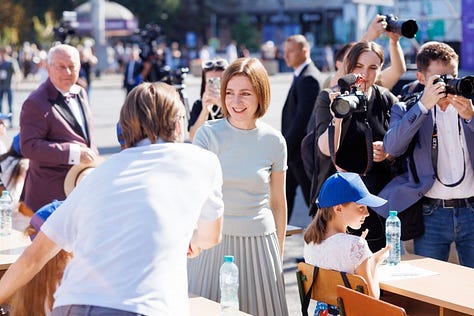
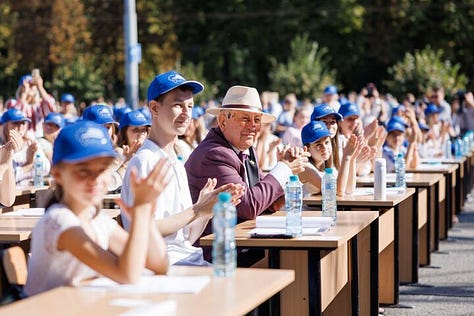
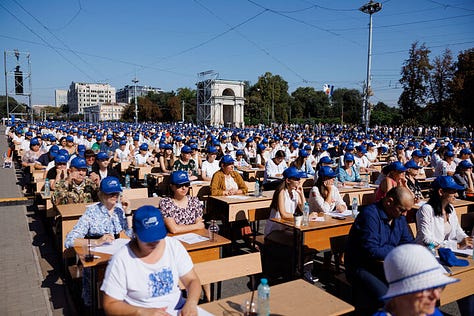
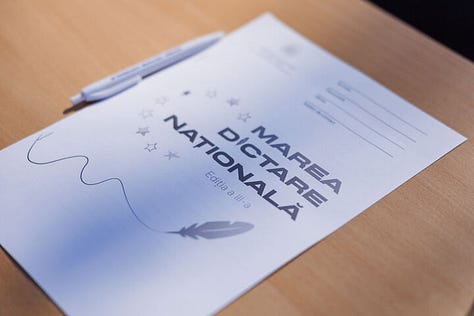
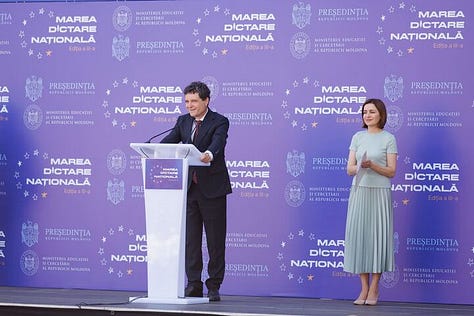
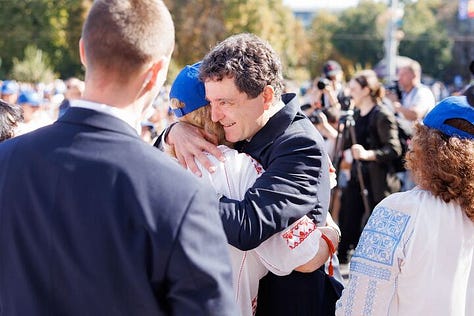
Elections Updates
Last week the parties began their elections campaigns. We’ll return soon with some Deep Dive articles looking at the parties and their electoral platforms. Here’s a roundup of the top election news of the last week:
The Patriotic Bloc drew controversy by launching their campaign outside of the Capriana Monastery. At the event they promised to lower energy prices and launched their campaign under the slogan "We believe in Moldova." The event drew outrage online as people noted that red flags bearing a hammer and sickle flying outside of a monastery that was forcibly liquidated by the Soviets in the 1960s - along with almost all other religious institutions in Moldova. Responding to criticism, and allegations of political messaging, the abbot insisted that he does not control the public land outside of his gates and that he had nothing to do with the event.
Election monitoring NGO PromoLex has called for opening 28 polling stations for Transnistrian residents. They cited the importance of political participation to the eventual (hoped) democratic reunification of the country and criticized the CEC’s plan to open 12 polling stations as insufficient.
Mayor Ion Ceban traveled to Rome despite his Schengen ban. Romania’s Ministry of Foreign Affairs later qualified that Italy had given him a short stay visa (until Sept 3) so that he could attend a UNESCO sponsored Conference of Mayors. Asked about his travel restrictions Ceban again called the ban political and stated that he is not a threat saying “I am not Bin Laden, I cannot pose a threat in this sense.”
The CEC voted to deny electoral registration to Plahotniuc’s PDMM party. They voted after 6 hours of debate with a split vote of 6-3. The ban was based on warnings from the Security and Intelligence Service (SIS) and actions to suspend the party by the Public Services Agency.
The Supreme Court of Justice (SCJ) ruled on other party exclusions. The court upheld the CEC’s decision to exclude Victoria Furtuna’s Moldova Mare party, Ilan Shor’s Renaissance Party and the Centrist Union Party from the elections. They also upheld the CEC’s decision to exclude Vlad Filat’s PLDM from the elections. The reasoning differed from party to party, but mostly involved technical violations regarding missed deadlines and filings. The SCJ ruled against the CEC forcing them to register the New Historical Choice (NOI) party in the elections. CEC had chosen to exclude them because a number of known Shor party agents are on the NOI party list. SCJ ruled that simple affiliation with a party ruled unconstitutional is not grounds for excluding the whole party.
ZdG did not say, but presumably the reason that Irina Zahara was not vetted by Adam was that she was sent to him by Shor’s team. A small mistake in leaving her phone number in a database the fully compromised an elaborate operational security system.
There are basically 2 options here - “hactivists” or a nation state actor. There are no instances that I am aware of where a hactivist network took interest in Moldova. Last election, Moldova Matters exclusively reported that nation state actors (aka some Western intelligence service) had intervened in Moldova’s affairs. In this case we don’t know (yet).


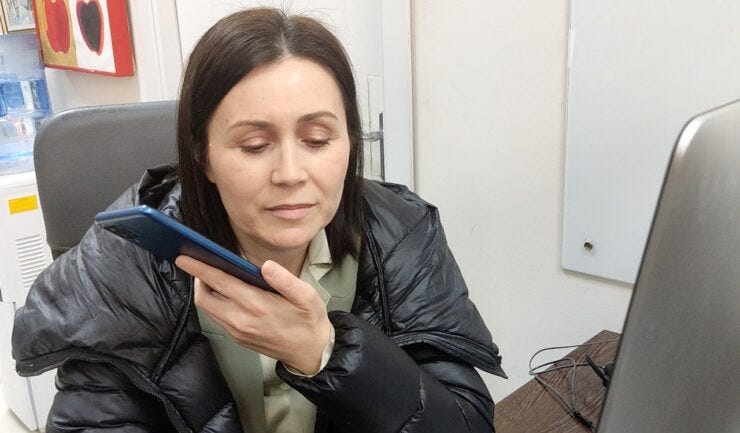
Excellent article, thanks!